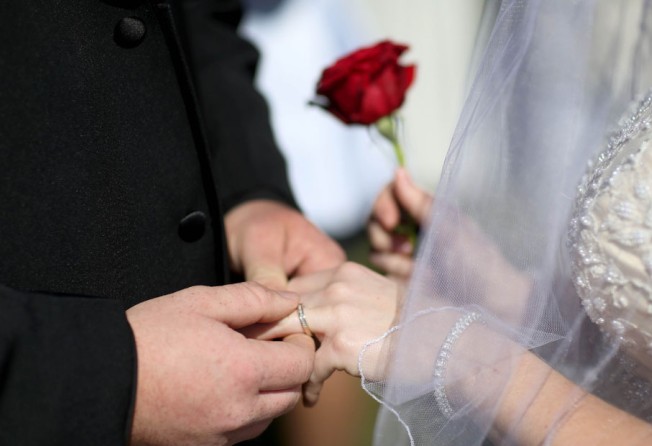'Marry young' ad over holiday annoys China's under-pressure singles
Dating website slammed for TV commercial that shows young woman succumbing to family pressure to marry

In a recent TV advertisement, an elderly woman constantly asks her 20-something granddaughter, "Are you married yet?" Each time the question is posed, the grandmother appears older and weaker.
Facing such pressure, the young girl decides she can't be picky in choosing a mate, and gets married. She appears in her wedding dress, husband in tow, before her grandmother, who is lying in bed, apparently close to death. Seeing the couple, she smiles with satisfaction. Then a line on the TV screen appears: "Never wait too late to love."
The advertisement is for dating website Baihe.com and was shown widely during the Lunar New Year holiday, when family reunions can be traumatic for single people at the wrong end of their 20s.
On the mainland, marriage is not left to the discretion of the individual - it involves continuing the family bloodline, and so relatives will not be shy about expressing the view that it's time to settle down.
A recent survey by China Youth Daily showed 89 per cent of 7,932 respondents said they had seen or heard of young people being pressured to get married during the holiday. Some parents use the occasion to line up dates for their unwed children.
In the survey, 52 per cent of respondents cited not having met "Mr/Miss Right" as the reason why they were not married. Young people aged between 25 and 30 years old were under the most pressure to get married, the survey said.
Other reasons included a limited social network, the financial burden posed by marriage, and a busy work schedule.
Dubbed "leftover" men and women, those young people feel so pressured by their parents that some rent a boyfriend or girlfriend to take home.
Many dating websites use the fear to their advantage. According to media reports, the traffic to some of these websites doubles during the holiday. Baihe.com's ad was run by several satellite TV programmes when a lot of people were sitting around bored and likely to turn on the television. But the ad run might have been too big.
"I switched to other channels immediately when the ad came on. If my parents were present, I found an excuse to leave or just sat there pretending to read my mobile phone," one woman wrote in a posting on Sina Weibo. "I was mad when I heard my parents sigh after watching the ad."
Tens of thousands of people vowed to boycott the website over what they said was undue pressure to get married.
The company defended the campaign. "Our advertisements always try to be emotional. This year's advertisement is based on a real story, but the public response was totally beyond our expectation," Baihe.com told local media.
Newspaper commentaries did not support the website. "The advertisement links marriage directly with the traditional Chinese value of filial piety and attempts to guilt-trip young people into marriage. Isn't it a sort of kidnapping in the name of morals?" Beijing Times said. A commentary on Sichuan-based news website Newssc.org accused Baihe.com of exploiting young people's vulnerabilities. "They have added salt to young people's wounds. This will definitely be met with resistance."
A commentary in Jinling Evening Post blamed singletons' discontent as a fear of marriage.
"The advertisement is far from being horrible. The real horror might be caused by some single people's fear of marriage … For Chinese people, marriage is never just a personal issue, but also concerns the propagation of the family bloodline," it said.
A Xinhua report quoted Wu Hong, a marriage consultant in Hangzhou , as saying the controversy reflected a change in the younger generation's thinking: "This is a positive [development]. Marriage should be dealt with carefully. The basic principle of marriage should be that one marries for oneself, not one's family."